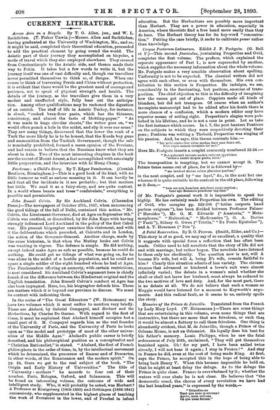In the series of "The Great Educators" (W. Heinemann) we
have two volumes which it must suffice to mention very briefly. These are Abelard, by Gabriel Compayr6, and Herbart and the Herbartians, by Charles De Garmo. With regard to the first of these, it must be explained that Abelard himself occupies but a small part of it. M. Compayr6 regards him as the real founder of the University of Paris, and the University of Paris he looks upon as "the model and prototype of most of the other univer- sities of the Middle Ages." Abelard's public career is briefly described, and his philosophical position as a conceptualist and " Christian Rationalist," is stated. " Abelard, the first of French philosophers in the order of time; is, by the intellectual movement which he determined, the precursor of Ramus and of Descartes, in other words, of the Renaissance and the modern spirit." On pp. 24, there we get to the real subject of the book, " The Origin and Early History of Universities." The title of " University - mothers " he accords to four out of their number, Paris, Bologna, Oxford, and Salamanca. This will be found an interesting volume, the outcome of wide and intelligent study. Who, it will probably be asked, was Herbart P A Professor at Konigsberg (1809-1833) and Gottingen (1833-1841) successively, who supplemented in the highest places of teaching the work of Pestalozzi in the lower, and of Froebel in infant
education. But the Herbartians are possibly more important than Herbart. They are a power in education, especially in America, where theorists find a free hand more easily than they do here. The Herbert theory has for its key-word "concentra- tion." Putting the case briefly, it seeks to cultivate power rather than knowledge.






































 Previous page
Previous page